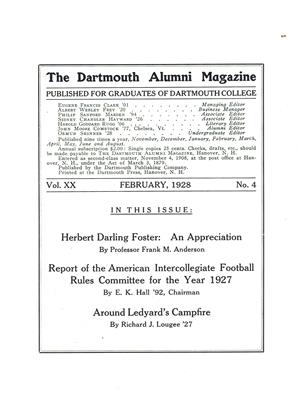Wholesome Marriage. By Ernest R. Groves '03, and Gladys H. Groves. Houghton Mifflin Company, New York, 1927. Pp. viii, 233.
Professor and Mrs. Groves have collaborated Professor again to write another helpful little book of advice. "Wholesome Childhood," the popular predecessor of "Wholesome Marriage," was written to assist parents whereas the present volume is ostensibly planned to serve as a source book of wholesome, concrete counsel to those contemplating marriage or who have but recently been married. The book seems to show that the authors write from a rich background of intimate knowledge of the married history of numerous couples, and it is their hope that the information contained in the book will be helpful in making marriage a success.
The treatment of the subject is distinctly of a popular nature. The social side of marriage is stressed to the total exclusion of any consideration of the sex problems of the marriage relationship. This is a serious delimitation of the subject and the advice offered to young couples will seem as a result to be somewhat platitudinous, unreal and out of touch with some of the really pressing problems connected with this delicate human relationship. If one desires a balanced quota of advice, "Wholesome Marriage" must be supplemented by the reading of such a work as "Modern Marriage" by Paul Popenoe which offers a candid exposition of the biological point of view.
Most phases of the various stages of the marriage relationship are considered. Information that the authors consider useful is given on such matters as courtship, the honeymoon, starting right, the question of the family pocketbook, relatives and too much mother-inlaw, family friction, family pitfalls, children and finally, growing old together.
The importance of thinking in advance of the problems of marriage is emphasized because of the lasting influence of the beginning over the whole marriage career. The continued development of both parties during , the entire period of the union is considered essential if the marriage is to be termed a success. This accordingly presupposes a degree of planning. What is a home? The authors have a very definite test of this: "There is only one test for a home. Does it send out its members well trained to play the game of life? If not, no matter how orderly and comfortable it may be, it is a mere shell of a home."
The authors are of the opinion that there is no evidence to show that marriage was ever more successful than it is now. Formerly marriage failures were hidden; today conditions permit them to be openly expressed. It was true at one time that if the marriage contented the man it was a success; the wife's feelings did not matter. All that is changed nowadays and wives refuse to be thwarted and to remain silent and unprotesting. The net result of this change is of course to make it more difficult for marriage to succeed.
A few typical samples of advice scattered throughout the volume may be given. Young people are advised against marrying an unthinking optimist. It is claimed that the optimism of such persons usually should be spelled selfishness. "Wives should never approach husbands for money for a new hat before dinner." Feminine tactics after marriage should aim at keeping the husband in good humor just as it was important to keep him on tenterhooks before marriage. Humor is considered a safer quality in the early days of marriage than punctilious anxiety. Camping out-of-doors on the honeymoon is gravely advised against as dangerous. Much more information of this sort is liberally given so that success in marriage may be assured.
The need of scientific efforts to conserve the family is again stressed as in former books by Professor Groves. Love need not be blind and would not be, say the authors, if a Bureau for Matrimonial Counsel were generally available. They consider that this would be an effective means of help. Perhaps it is true, as they assert, that "good advice rather than more law is our best weapon in trying to cut down our increasing divorce rate."
The forward-looking point of view of the book and its consideration of family problems in terms of modern conditions are especially commendable features that will impress the reader.
 View Full Issue
View Full Issue
More From This Issue
-
 Sports
SportsREPORT OF THE AMERICAN INTERCOLLEGIATE FOOTBALL RULES COMMITTEE FOR THE YEAR 1927
February 1928 By E. K. Hall '92 -
 Lettter from the Editor
Lettter from the EditorEditorial Comment
February 1928 -
 Article
ArticleHERBERT DARLING FOSTER An Appreciation
February 1928 By Frank M. Anderson -
 Class Notes
Class NotesClass of 1918
February 1928 By Frederick W. Cassebeer -
 Class Notes
Class NotesClass of 1921
February 1928 By Herrick Brown -
 Article
ArticleCOLLEGE NEWS
February 1928
Ralph P. Holben
-
 Books
BooksSocial Problems and Education
March, 1926 By Ralph P. Holben -
 Books
BooksOUTDOOR RECREATION LEGISLATION AND ITS EFFECTIVENESS
JUNE 1930 By Ralph P. Holben -
 Books
BooksTHE TRIAL OF BRUNO RICHARD HAUPTMANN
March 1938 By Ralph P. Holben -
 Books
BooksANTICIPATING YOUR MARRIAGE.
November 1955 By RALPH P. HOLBEN -
 Books
BooksTHE STORY OF BLINDNESS.
July 1956 By RALPH P. HOLBEN -
 Books
BooksSOCIETY AND CULTURE.
November 1957 By RALPH P. HOLBEN
Books
-
 Books
BooksGreat Escapes
MARCH | APRIL 2021 -
 Books
BooksARCHITECTURE OF THE WESTERN RESERVE, 1800-1900.
FEBRUARY 1972 By JOHN HURD '21 -
 Books
BooksDeath of the Visual
MAY 1983 By Jon H. Appleton -
 Books
BooksBACK WHERE I CAME FROM
April 1939 By Kenneth A. Robinson -
 Books
BooksIntolerable Ambiguity
November 1980 By R. H. R. -
 Books
BooksAMERICAN LABOR UNIONS; ORGANIZATION, AIMS, AND POWER.
July 1950 By Robert Swanton


